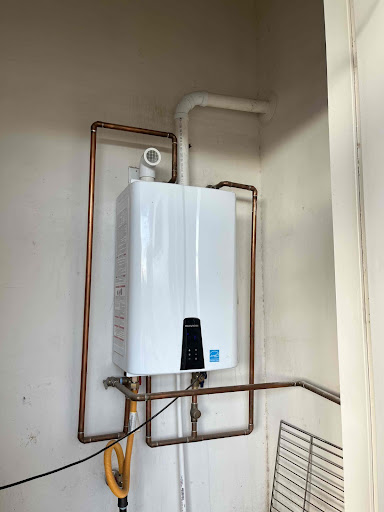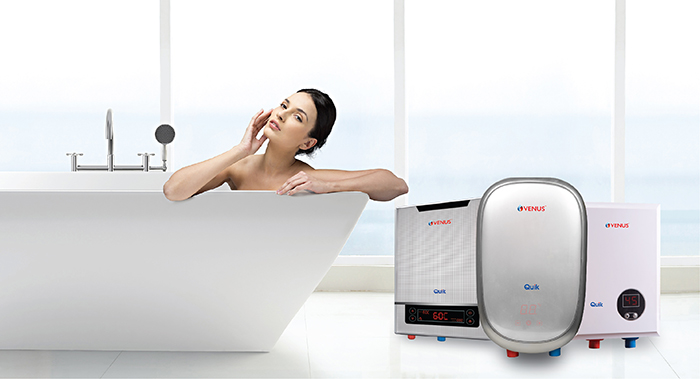Your Path To Securing The Benefits Of Tankless Water Heaters
Your Path To Securing The Benefits Of Tankless Water Heaters
Blog Article
In this article down the page yow will discover lots of professional data regarding 5 Benefits of Tankless Water Heaters.

In a globe where comfort and effectiveness reign supreme, it's not a surprise that homeowners are constantly in search of smarter means to handle their home's power usage and convenience. One technology that has gradually obtained popularity is the tankless hot water heater. Yet exactly what makes these systems stand out from the traditional tank-based models the majority of us grew up with? Let's dive in and check out the benefits of tankless hot water heater, helping you decide if it's time to make the switch in your house.
Introduction
Photo this: you enter the shower after a lengthy day, anticipating a calming cascade of hot water, only to be welcomed by icy beads because the last person utilized everything up. Audio acquainted? Standard water heaters keep a set quantity of hot water, suggesting you're at the mercy of that storage tank's supply. Tankless systems, on the other hand, warm water on demand. No more running out mid-shower, say goodbye to wrestling with schedules just to guarantee warm water is available.
Comprehending Tankless Hot Water Heater
What Are Tankless Hot Water Heater?
Tankless hot water heater, sometimes referred to as on-demand or immediate water heaters, give warm water only as it's required. Rather than keeping gallons of pre-heated water, these devices kick into action the minute you turn on the faucet. Water goes through a warmth exchanger, heating up in real-time, implying you get a nonstop circulation of hot water without the requirement for a large container sitting lazily by.
Just how Do They Differ from Traditional Equipments?
Standard heating systems hold a tank of warm water, using power to maintain that tank at a regular temperature. Tankless systems remove the standing supply, reducing wasted power and the large impact of a big cylinder. Basically, you're upgrading from a "accumulation" mindset to a "made-to-order" method.
Common Types of Tankless Units
Tankless water heaters normally are available in two selections: gas and electrical. Gas versions often tend to supply greater flow prices, ideal for larger households, while electrical designs typically offer smaller homes and are typically easier to set up. Furthermore, some systems are developed for point-of-use (offering one component) while others can deal with the entire home's hot water requirements.
Key Benefits of Tankless Hot Water Heater
1. Limitless Hot Water Supply
Ever needed to arrange showers so everybody obtains their fair share of warm water? With tankless, that becomes a thing of the past. As long as the heating unit's circulation capability isn't gone beyond, you can take back-to-back showers without turning into a popsicle.
2. Energy Efficiency and Expense Financial Savings
No more heating a giant container's well worth of water and keeping it toasty all day. Tankless heating systems lower standby energy losses, which can reduce utility expenses. While the initial price might be greater, the long-lasting cost savings commonly warrant the investment.
3. Space-Saving Layout
If your home is short on storage, removing the large container liberates useful area. Tankless systems are small and can commonly be installed on walls, hidden in edges, or set up in tight utility closets without monopolizing the whole space.
4. Longer Lifespan
A well-maintained tankless hot water heater can outlive its tank-based relative. Conventional containers might last 10-15 years, while tankless designs can keep downing along for two decades or even more, making them a solid investment gradually.
5. Improved Water High Quality
Storing water in a storage tank can sometimes cause debris accumulation or a somewhat "off" preference. With tankless systems, fresh water is heated up on the spot, decreasing the opportunities of sediment buildup and possibly supplying cleaner-tasting water.
Considerations Before Changing
Though the advantages are compelling, it's smart to think about a couple of aspects before totally committing.
Preliminary Financial Investment Expenses
Tankless heating systems usually feature a higher upfront price tag. In between the device itself and possible installment adjustments, the initial cost could provide you sticker shock. However remember to see it as a long-term investment.
Setup Requirements
Depending upon your home's infrastructure, you could require additional electric capability or gas line upgrades. Ensure you understand the installation needs and talk to a specialist to stay clear of shocks.
Reviewing Your Home's Water Use Patterns
If your house simultaneously uses several components with high warm water need, make sure the system's circulation price fulfills your needs. Understanding your usage patterns assists you select the best size and type of tankless heating unit.
Maintenance and Care Tips
Tankless systems are relatively reduced maintenance, but they aren't set-it-and-forget-it devices.
Regular Cleaning and Descaling
Tough water minerals can develop in the heat exchanger, influencing performance. Routine descaling (usually suggested annually) keeps the unit running at peak performance.
Yearly Specialist Examinations
A yearly checkup from an expert guarantees minor concerns are caught early. They'll examine the unit's performance, search for leaks, and aid preserve optimum effectiveness.
Ensuring Appropriate Ventilation
For gas models, correct ventilation is vital to securely get rid of exhaust gases. Ensure venting systems are clean and appropriately installed to avoid any possible safety risks.
Contrasting Different Brands and Designs
Not all tankless hot water heater are produced equivalent.
Investigating Trustworthy Suppliers
Look for respectable brands with a background of creating top quality devices. A reputable producer typically provides much better consumer support and longer service warranties.
Reviewing Testimonials and User Comments
User testimonials and responses from next-door neighbors or pals who have gone tankless can offer useful understandings. In some cases, real-life experiences can be much more informing than advertising sales brochures.
Installment: DIY or Expert?
While some house owners enjoy tackling projects themselves, tankless setup may not be the very best time to break out the tool kit.
Benefits and drawbacks of DIY Installation
A do it yourself set up could save cash, but it features threats. Wrong setup can lead to ineffectiveness or safety issues. If you're handy and have experience, it might be feasible-- however proceed with caution.
When to Call a Professional Plumbing
For a lot of, calling a pro guarantees everything's done properly. A specialist plumbing recognizes neighborhood codes, sizing requirements, and airing vent criteria, reducing the risk of accidents.
Maximizing Efficiency
You've invested in a tankless unit-- currently maximize its efficiency.
Optimum Temperature Setups
Most people establish their systems between 120-140 F. Readjusting the temperature can boost comfort and savings. Experiment to discover a pleasant area that doesn't waste energy.
Coupling With Low-Flow Fixtures
Wish to extend your device's abilities? Take into consideration setting up low-flow showerheads and taps. They decrease water use, permitting your tankless system to provide a stable stream of hot water without straining.
Ecological Impact
Tankless water heaters straighten with greener living objectives.
Minimized Carbon Footprint
By utilizing less energy and just heating water as required, tankless systems can reduce your home's carbon footprint, minimizing your ecological effect.
Preserving Natural Resources
Less energy consumption and less squandered warm water translate into less natural deposits being made use of, an environmental win-win.
That Benefits Many from Tankless Heating units?
The charm of tankless heating systems is that they can fit a variety of households.
Big Households vs. Solitary Passengers
Large households could like the endless warm water supply, while solitary owners appreciate the energy savings from not heating a whole tank for simply one person's early morning shower.
House Owners with Minimal Area
If your home is short on square video footage, losing the large storage tank maximizes space for various other fundamentals-- or maybe simply much more breathing space.
Eco-Conscious Customers
Going tankless aligns with eco-friendly worths, guaranteeing you're not squandering power or resources.
Future Trends in Tankless Hot Water Heater
The world of home appliances is ever-evolving, and tankless water heaters are no exemption.
Smart Home Combination
Imagine changing your hot water heater's temperature via an app or obtaining upkeep informs on your phone. As smart home tech breakthroughs, we'll see even more connectivity and convenience.
Improvements in Innovation
R&D is frequently improving heat exchangers, making systems more effective and sturdy. Future models might be also quieter, extra compact, and far better suited for differing environments.
Final thought
Selecting a tankless hot water heater is greater than just upgrading your home's hot water system; it's investing in long-term comfort, power effectiveness, and a greener way of life. By considering your family's water use, bearing in mind installation needs, and dedicating to regular maintenance, you can take pleasure in a constant stream of warm water without the luggage of a cumbersome tank. As technology progresses, you can look forward to even smarter, more reliable tankless remedies that not only make your life much easier yet additionally benefit the world.
Pros and Cons of Tankless Water Heaters
Tankless Water Heater Pros
Saves Energy: Simply put, you re spending less energy to create hot water, so your total carbon footprint goes down, not to mention your bills. Lasts Longer Than Storage Tanks: Storage tank units need to be replaced every 15 years or so. But tankless units? They can last for 30 years before they give out on you. Constant Hot Water: Need to take a shower and don t want the water running cold? Awesome it won t. The water will stay hot the entire time because it creates hot water on demand. Saves You Money: Less water usage equals less money. Beyond that, you re not paying to keep water hot 24/7. Those savings add up quickly. Better for the Environment: Less water waste is better for everyone. It saves you money, but it s also environmentally conscious at the same time. Tankless Water Heater Cons
It Can Take a Minute: Depending on your specific unit and its placement, it can take anywhere from 10 seconds to 2 minutes to fully heat up. Because there s no storage tank, it heats water as you need it. Upfront Purchase Price: While we talked about their longevity, there s sticker shock when you look at brand-new tankless units to install. It pays for itself, but it s still a big chunk of change at first. Has its Limits: If you run multiple appliances at once, such as the dishwasher, washing machine, and maybe you take a shower at the same time, there might not be enough hot water. https://www.airsouthnow.com/blog/water-heater-service/pros-and-cons-of-tankless-water-heaters/

Hopefully you enjoyed reading our post on Six Benefits of a Tankless Hot Water Heater. Thanks for taking time to read our post. Sharing is nice. You won't know, you may just be helping someone out. I cherish reading our article about Why You Should Consider a Tankless Water Heater.
Click For More Info Report this page